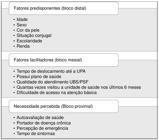Abstract
Background
Studies in Brazil and in several countries indicate that emergency services are often used as gateways to health systems, overburdening them and impacting on the quality of service provided to the population. However, little is known about this phenomenon in the Emergency Care Units (EUCs) of our country.
Objective
To investigate the variables associated with the inadequate use of two EUCs in a large municipality.
Method
A cross-sectional study was carried out with a sample of 756 individuals that analyzed individual, contextual and service-related variables associated with the inappropriate use of EUCs through a hierarchical multiple logistic regression model.
Results
The final regression model showed that individuals who had self-perceived their condition as an emergency and whose age was equal to or older than 60 years presented high odds to seek these services for non-urgent reasons.
Conclusions
Individual variables were associated with non-urgent use of the ECUs. Future studies of a qualitative nature may help to understand the reasons for the inadequate use of these services by these individuals.
Keywords:
epidemiology; emergency medical services; needs and demand health services; information services

 Thumbnail
Thumbnail
